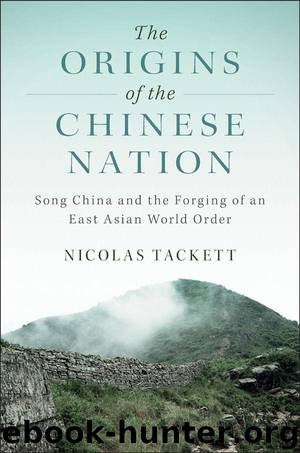The Origins of the Chinese Nation: Song China and the Forging of an East Asian World Order by Tackett Nicolas

Author:Tackett, Nicolas [Tackett, Nicolas]
Language: eng
Format: azw3
Publisher: Cambridge University Press
Published: 2017-12-30T16:00:00+00:00
Han Ethnic Solidarity
Accompanying this new ethnic language were new assumptions about the political loyalties of Han people, notably of those living beyond the boundaries of the Song state (element 5 in Table 4.1). Naomi Standen has shown that, in the tenth century and earlier, there was little expectation of Han ethnic solidarity or loyalty – that is, there was little sense that ethnically Han people should preferentially ally themselves with or proffer allegiance to a regime ruled by an ethnically Han elite.67 Though the Later Jin would in subsequent centuries be criticized for its alliance with the Khitans, in fact, numerous other regimes of the tenth century – both Chinese (Later Liang and Southern Tang) and non-Chinese (Later Tang and Later Han) – made alliances with the Khitans indiscriminately in their struggles to survive within a complex multi-state system.68 Meanwhile, frontier warlords of the Tang-Song interregnum seeking to maintain their autonomy commonly switched sides between the Khitan regime to the north and the sequence of regimes to the south based along the Yellow River, with little regard for the ethnic identities of the ruling emperors. Moreover, contemporaneous or near-contemporaneous historians writing in the tenth century did not condemn these men for their shifting allegiances. It was only in the subsequent eleventh century that revisionist historians began to denounce individuals for what were now seen as acts of disloyalty. A primary component of this change in attitude (and the focus of Standen's attention) was an increasingly rigid insistence on absolute loyalty to the dynasty rather than personal loyalty to an individual ruler. But one can also discern in the eleventh century the increasingly frequent articulation in political discourse of the idea that Han people ought to be loyal to Chinese regimes.69
In assessing the nature of political loyalties – including both actual feelings of loyalty and those insisted upon by a hegemonic ideology – one can imagine a variety of different forms, including both loyalty directed toward people and loyalty directed toward ideals, be they ethical principles or systems of government. Thus, one can imagine loyalty to an individual, such as a military commander, a warlord, or a sovereign; to a dynast, in which case the loyalty derives from a commitment to the dynastic principle; to the land and people of a geographically bounded region, as in the cases of modern nationalism or subnational regional attachments; to a transnational community, defined by education, religious affiliation, gender, or socioeconomic class; to an imperial system; to the civilized world, such as what one finds in certain post-Enlightenment moral cosmopolitanisms or among late imperial Confucians as described by Joseph Levenson;70 or one might imagine loyalty to an ethnicity and culture. In actual practice, we find all of these at different moments in Chinese history. Given strong expectations of allegiance to the reigning emperor, it is not easy to distinguish ethnic loyalty from loyalty to dynasty. The exception involves Han people living beyond the border, in territories that had never been under the control of the Song Dynasty.
Download
This site does not store any files on its server. We only index and link to content provided by other sites. Please contact the content providers to delete copyright contents if any and email us, we'll remove relevant links or contents immediately.
The Secret History by Donna Tartt(18797)
The Social Justice Warrior Handbook by Lisa De Pasquale(12115)
Thirteen Reasons Why by Jay Asher(8762)
This Is How You Lose Her by Junot Diaz(6741)
Weapons of Math Destruction by Cathy O'Neil(6110)
Zero to One by Peter Thiel(5657)
Beartown by Fredrik Backman(5570)
The Myth of the Strong Leader by Archie Brown(5395)
The Fire Next Time by James Baldwin(5220)
How Democracies Die by Steven Levitsky & Daniel Ziblatt(5106)
Promise Me, Dad by Joe Biden(5064)
Stone's Rules by Roger Stone(5005)
A Higher Loyalty: Truth, Lies, and Leadership by James Comey(4818)
100 Deadly Skills by Clint Emerson(4817)
Rise and Kill First by Ronen Bergman(4676)
Secrecy World by Jake Bernstein(4614)
The David Icke Guide to the Global Conspiracy (and how to end it) by David Icke(4594)
The Farm by Tom Rob Smith(4414)
The Doomsday Machine by Daniel Ellsberg(4390)
